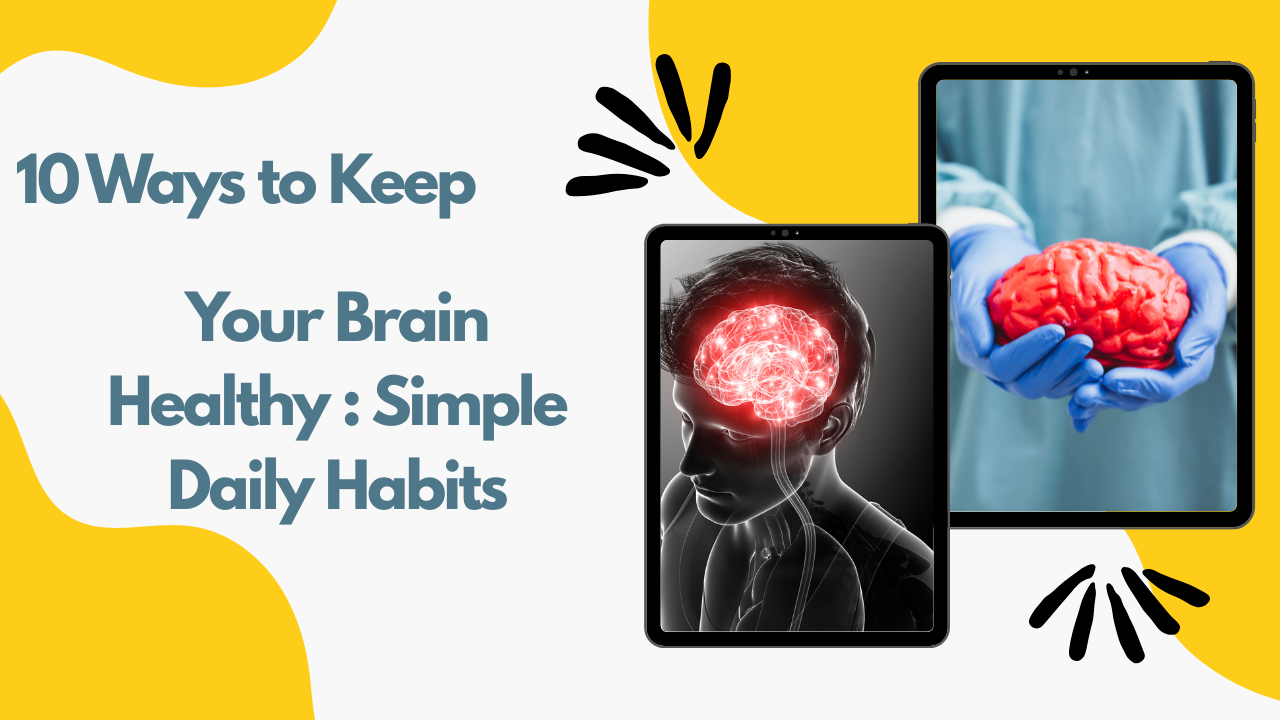Your brain is the most powerful part of your body. It manages everything you do — from thinking, remembering, and feeling emotions to controlling touch, movement, and breathing. It also helps regulate temperature and other key body functions. Every action, feeling, and reaction starts in the brain.
Just like your heart or muscles, your brain needs care and attention to stay healthy. Giving it the right support through good nutrition, regular exercise, enough sleep, and mental stimulation helps it work efficiently. Taking care of your brain can improve memory, focus, and emotional balance.
Science continues to uncover new facts about how the brain works. But one thing is certain: keeping your brain healthy is key to avoiding problems like memory loss and confusion later in life. A healthy brain helps you stay active, productive, and joyful at every stage of life. It’s never too early—or too late—to start supporting your brain.
In this in-depth guide, we’ll explore 10 effective and scientifically backed ways to keep your brain healthy, sharp, and strong—both now and into the future.
Top 10 Ways To keep Your Brain Healthy
Eat a Brain-Boosting Diet
“You are what you eat” applies especially to your brain.

What you eat has a strong impact on how your brain works and feels. The foods you choose every day help build the brain’s structure and support how it functions. Healthy meals can improve thinking, memory, and mood over time.
One of the best eating habits for brain health is the Mediterranean diet. This diet includes plenty of fruits, vegetables, whole grains, nuts, fish, and healthy fats like olive oil. Studies show that people who follow this diet often have sharper minds and a lower risk of memory problems as they age.
When looking at the 10 ways to keep your brain healthy, food plays a big part. Choosing brain-boosting foods is an easy and effective step toward better mental clarity. Along with staying active, sleeping well, and managing stress, eating smart is key to keeping your brain strong and alert throughout life.
Key Brain-Friendly Foods:
Fatty Fish (salmon, mackerel, sardines): Rich in omega-3 fatty acids, vital for building brain and nerve cells.
Leafy Greens (spinach, kale, broccoli): Packed with antioxidants and Vitamin K.
Berries (blueberries, strawberries): Contain flavonoids that improve memory.
Nuts and Seeds: High in vitamin E, which may slow cognitive decline.
Whole Grains: Provide a steady source of energy to fuel brain function.
Turmeric and Spices: Curcumin (in turmeric) can cross the blood-brain barrier and has anti-inflammatory properties.
Pro Tip: Limit sugar and processed foods. High sugar intake has been linked to impaired memory and reduced brain volume.
Get Regular Physical Exercise
Your brain thrives on movement.
Exercise doesn’t just strengthen your muscles—it also supports your brain. Staying physically active plays an important role in keeping your mind sharp and your memory strong. Regular movement helps your brain stay in good shape.
Aerobic activities like walking, jogging, swimming, or dancing increase blood flow to the brain. This improved circulation brings more oxygen and nutrients, which helps brain cells work better. It also lowers inflammation, which is linked to brain aging and cognitive decline.
One of the top 10 ways to keep your brain healthy is to include regular physical activity in your daily routine. Exercise encourages the brain to create new neurons, a process called neurogenesis. This supports learning, focus, and emotional health. Even short walks or light activity can make a big difference in how your brain performs now and in the future.
Benefits of Exercise for the Brain:
Enhances memory and learning
Improves mood and reduces symptoms of anxiety and depression
Delays age-related cognitive decline
Stimulates the release of brain-derived neurotrophic factor (BDNF), a protein that fosters neuron growth
Best Exercises:
Brisk walking
Jogging
Swimming
Dancing
Cycling
Yoga (also aids mental clarity and reduces stress)
How Much? : Aim for 150 minutes of moderate-intensity exercise per week, as recommended by health authorities.

Prioritize Quality Sleep
Sleep is your brain’s daily reset button.
Sleep plays a powerful role in keeping your brain healthy. While you rest, your brain works hard to clear out harmful toxins, repair damaged cells, and organize the information you learned during the day. This helps improve memory and thinking.
When you don’t get enough sleep regularly, your brain can suffer. Ongoing sleep deprivation can lead to trouble focusing, forgetfulness, mood swings, and even a higher chance of developing conditions like dementia later in life.
Among the 10 ways to keep your brain healthy, getting enough quality sleep is one of the most important. Most adults need 7 to 9 hours each night. Good sleep habits, such as going to bed at the same time daily and keeping your sleep space quiet and dark, support your brain’s ability to function at its best. Rested brains are sharper, calmer, and more alert.
Sleep Hygiene Tips:
Stick to a consistent sleep schedule
Avoid screens 1–2 hours before bed
Limit caffeine and alcohol in the evening
Create a calming bedtime routine
Keep your bedroom cool, quiet, and dark
How Much? : Most adults need 7–9 hours of quality sleep per night. Anything less can impair brain performance and long-term health.
Engage in Lifelong Learning

Keep your brain curious, and it will stay sharp.
Your brain gets stronger the more you use it. Just like your muscles grow with exercise, your brain improves when it faces new challenges. Activities that require thinking, focus, or creativity help keep your brain active and sharp.
Learning new skills, doing puzzles, or changing your daily routine encourages the brain to form fresh connections. This process is called neuroplasticity—your brain’s natural ability to adapt, change, and grow stronger over time.
One of the 10 ways to keep your brain healthy is to keep learning and trying new things. Whether it’s reading a book, learning a language, or playing a strategy game, mental exercises help protect memory and thinking skills. Keeping your brain busy with different tasks improves problem-solving and keeps your mind flexible as you age. Simple changes in your routine can make a big difference in brain health.
Activities That Stimulate Your Brain:
Learn a new language
Pick up a musical instrument
Take online courses
Read books and write
Play strategic games (chess, Sudoku, crosswords)
The Science: A 2013 study found that older adults who learned complex skills such as digital photography or quilting showed better memory function than those who did not.
Manage Stress Effectively
Chronic stress is toxic to your brain.
Constant stress can take a toll on your brain. When you’re stressed for long periods, your body keeps releasing a hormone called cortisol. While cortisol helps in short bursts, too much of it over time can be harmful.
High cortisol levels can damage the hippocampus, the area of your brain linked to memory and learning. This may lead to forgetfulness, trouble concentrating, and slower thinking. Long-term stress can also affect mood and increase the risk of mental health problems.
Managing stress is one of the 10 ways to keep your brain healthy. Simple activities like deep breathing, meditation, gentle exercise, or spending time with loved ones can lower stress levels. Taking breaks and getting enough rest also help protect your brain from stress-related damage. Keeping stress under control supports clearer thinking, better memory, and emotional balance.
How to Lower Stress:
Practice mindfulness meditation: Just 10 minutes a day can reduce cortisol.
Engage in deep breathing and relaxation techniques
Spend time in nature
Practice gratitude journaling
Talk with a therapist or counselor if needed
Bonus Tip: Laugh more. Humor activates multiple areas of the brain and triggers the release of endorphins, promoting relaxation and brain health.
Stay Socially Connected

Your brain needs people, not just puzzles.
Staying socially connected is good for your brain. Talking with friends, joining group activities, or simply spending time with loved ones can help keep your mind active and alert. Social interaction gives your brain a healthy workout.
People with strong social connections are less likely to develop problems like depression, memory loss, or dementia. Engaging in conversations and shared activities stimulates your brain, helping improve focus, memory, and emotional well-being.
Among the 10 ways to keep your brain healthy, staying socially active is often overlooked but very important. Whether it’s a phone call, a walk with a friend, or joining a club, connecting with others helps build stronger brain networks. These regular interactions support mental sharpness and help protect your brain as you age. Making time for social connections is a simple yet powerful way to support brain health every day.
Ways to Stay Connected:
Join clubs, book groups, or community classes
Volunteer for local causes
Stay in touch with family and friends through regular meet-ups or calls
Use video calls if distance is a factor
Did You Know? : According to a Harvard study, good relationships are more predictive of long-term health and happiness than fame or fortune.
Avoid Harmful Substances
What you avoid is as important as what you consume.
Avoiding harmful substances is important for keeping your brain strong and healthy. Alcohol, tobacco, and recreational drugs can change how your brain works, even after short-term use. Over time, they can damage brain cells and affect memory, focus, and judgment.
Even moderate drinking has been linked to brain shrinkage, especially in areas related to learning and decision-making. Smoking and drug use can also reduce blood flow to the brain and increase the risk of stroke or other brain-related issues.
One of the 10 ways to keep your brain healthy is to limit or avoid harmful substances. Making healthy choices protects your brain from long-term damage and helps it function at its best. If you drink, do so in moderation, and avoid smoking or using drugs. Choosing a healthy lifestyle now can lead to better brain health and clear thinking in the future.

Brain-Safe Habits:
Limit alcohol to no more than one drink per day (for women) and two (for men)
Avoid smoking and exposure to second-hand smoke
Avoid recreational drugs, and use prescription medications responsibly
Protect your brain from environmental toxins like heavy metals and air pollution
Protect Your Head
Your brain is delicate—protect it.
Protecting your head is essential for keeping your brain safe. Traumatic brain injuries (TBI), even mild concussions, can affect how you think, feel, and remember. These injuries may cause problems with attention, memory, and mood, sometimes lasting for a long time.
Repeated head injuries can raise the risk of serious brain disorders. One such condition is chronic traumatic encephalopathy (CTE), which is linked to memory loss, confusion, and emotional changes. CTE and other neurodegenerative diseases can develop years after repeated trauma.
One of the 10 ways to keep your brain healthy is to prevent head injuries. Wear helmets during sports or biking, use seat belts in vehicles, and make your home safer to avoid falls. Taking simple steps to protect your head can make a big difference in maintaining long-term brain health and reducing the risk of serious problems in the future.
Safety Tips:
Always wear a helmet when biking, skating, or riding motorcycles
Use seat belts in vehicles
Prevent falls by keeping your home clutter-free and well-lit
Install safety bars in bathrooms if necessary
Use proper headgear during contact sports
Get Regular Mental Health Checkups
Mental health is brain health.
Mental health plays a major role in how your brain works. Conditions like depression, anxiety, and PTSD are closely tied to brain function. These issues can affect how you think, feel, and respond to daily life.
When mental health disorders are left untreated, they can harm brain function over time. People may struggle with memory, decision-making, and concentration. Emotional balance may also be affected, leading to stress, low energy, or mood swings.
Taking care of your mental health is one of the 10 ways to keep your brain healthy. Seeking support, talking to a professional, or using stress-relief techniques can make a big difference. Regular exercise, enough sleep, and strong social connections also support emotional well-being. A healthy mind helps your brain function clearly and stay sharp through every stage of life. Mental health care is brain health care.
What You Can Do:
Recognize symptoms early—fatigue, sadness, irritability, forgetfulness
Don’t hesitate to seek professional help
Incorporate therapy or counseling into your wellness plan
Combine mental health care with lifestyle changes for maximum benefit

A Note: Brain fog and forgetfulness aren’t always signs of aging—sometimes, they are symptoms of underlying mental health issues.
Stimulate All Your Senses
Multisensory engagement enhances learning and memory.
Your brain uses all five senses—sight, sound, touch, taste, and smell—to understand the world around you. These senses send signals to the brain, helping it process information, make decisions, and store memories. Each sense plays a role in keeping your brain active and alert.
When you engage your senses in different and meaningful ways, it helps keep your mind sharp. Activities like listening to music, tasting new foods, smelling fresh scents, or exploring new textures can boost memory and thinking skills. This becomes especially important as you grow older.
Stimulating the senses is one of the 10 ways to keep your brain healthy. Trying new experiences or simply paying closer attention to your surroundings can strengthen brain connections. Sensory activities are fun and easy ways to support brain health and stay mentally active throughout your life.
Ideas to Engage Multiple Senses:
Try cooking with new spices (smell, taste, touch)
Explore new places (sight, sound, movement)
Take art or sculpture classes (touch, sight)
Listen to different genres of music
Practice mindful eating
Science Insight: Research shows that multisensory stimulation (such as combining movement and sound) improves recall and learning more effectively than single-sense stimulation.
Conclusion

Taking care of your brain is just as important as caring for the rest of your body. Your brain controls everything you do—thinking, feeling, remembering, and moving—so keeping it healthy should be a daily priority. From eating well and exercising to getting enough sleep and staying socially active, each habit plays a key role in maintaining brain function. Even small changes in your routine, like learning something new or managing stress, can make a big difference over time.
Avoiding harmful substances, protecting your head, and taking care of your mental health are also essential parts of long-term brain care. As you age, these practices become even more important in preventing memory loss and supporting a clear, focused mind.
By following these 10 ways to keep your brain healthy, you can boost your mental sharpness, improve your mood, and enjoy a more active, fulfilling life at every stage. Brain health starts today.
FAQs
Q.1 Why is brain health important ?
Brain health is essential because your brain controls memory, emotions, learning, decision-making, and physical functions. A healthy brain supports overall well-being and quality of life.
Q.2 What are the 10 ways to keep your brain healthy ?
The 10 ways to keep your brain healthy include eating a balanced diet, regular exercise, good sleep, staying socially active, managing stress, avoiding harmful substances, protecting your head, continuous learning, caring for mental health, and stimulating your senses.
Q.3 Can brain health improve with age ?
Yes, with proper care and healthy habits, brain function can stay strong or even improve as you age. Learning new things and staying active can help keep your brain sharp.
Q.4 How does exercise benefit the brain ?
Exercise improves blood flow to the brain, reduces inflammation, and supports the growth of new brain cells, helping with memory and mental clarity.
Q.5 Does stress really affect brain health ?
Yes, chronic stress releases harmful hormones like cortisol, which can damage memory and learning areas in the brain over time.



